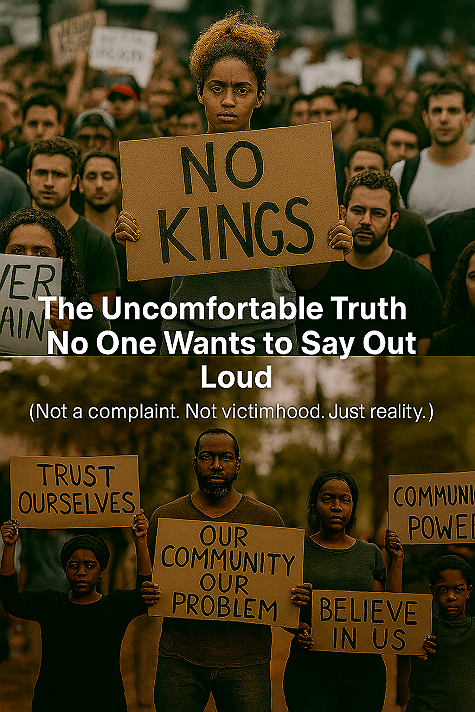The Uncomfortable Truth No One Wants to Say Out Loud
(Not a complaint. Not victimhood. Just reality.)
There’s a pattern—deeply consistent, painfully visible—that deserves honest acknowledgment: Black people often show up en masse for movements, campaigns, and protests created or amplified by white people. Yet when the call to action comes from within our own community—for our own liberation, economic power, or collective healing—silence, skepticism, or indifference often follows.
This isn’t about blame. It’s about seeing clearly what is happening… and why.
White-led initiatives frequently harness Black faces, voices, and pain to legitimize their causes. Our grief becomes their moral credibility. Our outrage fuels their campaigns. Our culture gives them edge, relevance, and “authenticity”—all while the architects of these efforts retain control, profit, and narrative power.
Meanwhile, when Black visionaries launch platforms, cooperatives, mutual aid networks, or calls for unity—initiatives designed by us, for us, with us—they often struggle to gain traction. Not because the ideas lack merit, but because they lack the unspoken stamp of approval: white validation.
Why does this happen?
It’s not laziness. It’s not apathy. It’s the invisible wiring of a system built on centuries of racial hierarchy:
- Trust has been redirected outward. Generations of exclusion from institutional power have trained many to believe that legitimacy comes only when the dominant group endorses something—even if that thing is meant to serve us.
- Visibility is controlled elsewhere. Without access to mainstream media, major funding, or algorithmic amplification, Black-led efforts often remain invisible, no matter how vital.
- Risk feels higher. Supporting a white-led cause feels “safe”—it’s backed by infrastructure, insurance, and social acceptance. Supporting a Black-led effort can feel like stepping into uncertainty, even when it’s the path to real liberation.
- We’ve been taught to consume, not co-create. Capitalism and colonialism didn’t just extract our labor—they conditioned us to wait for saviors instead of building our own.
And yes—white people don’t have to convince their communities to believe in themselves. They don’t have to prove that their ideas are “credible” simply because of their skin color. Their leadership is assumed. Their success is expected. Their movements are amplified before they even begin.
This isn’t jealousy. It’s observation.
The profound reality? True freedom won’t come from joining white people’s versions of justice—it will come from trusting our own.
It will come when we show up for Black creators with the same urgency we show for viral hashtags launched by corporations.
When we fund Black cooperatives like we fund celebrity endorsements.
When we treat Black-led organizing not as “risky” but as sacred.
This isn’t a call to reject interracial solidarity—it’s a call to center ourselves in our own liberation.
Because if we keep waiting for others to lead the way toward our freedom… we’ll be waiting forever.
The revolution doesn’t need more spectators.
It needs believers—especially in our own power.
—
This is not a complaint. It’s a mirror.
Look. Reflect. Then act—starting with what’s right in front of you.
#BlackLed #TrustOurselves #CommunityPower #EconomicLiberation #BeyondPerformanceAllyship


























